122 CD / String Trios: Haydn, Beethoven, Kreisler
Description
"According to the title page this is the ninth CD by the Gaede Trio. If the others are half as good as these ones then I’ve got some catching-up to do, I thought. Daniel Gaede, former leader of the Vienna Philharmonic Orchestra, and his colleagues from Berlin explore the whole bandwidth of interpretation, from a sparkling Haydn through Beethoven in his most dramatic C Minor mood to the café kitsch of Fritz Kreisler. The Kreisler arrangements by Fredo Jung do far more than simply convey the piano part: this is a fully thought-out composition for string trio, with a welcome fullness of sound and unexpected accompanying parts." (crescendo)
6 reviews for 122 CD / String Trios: Haydn, Beethoven, Kreisler
You must be logged in to post a review.

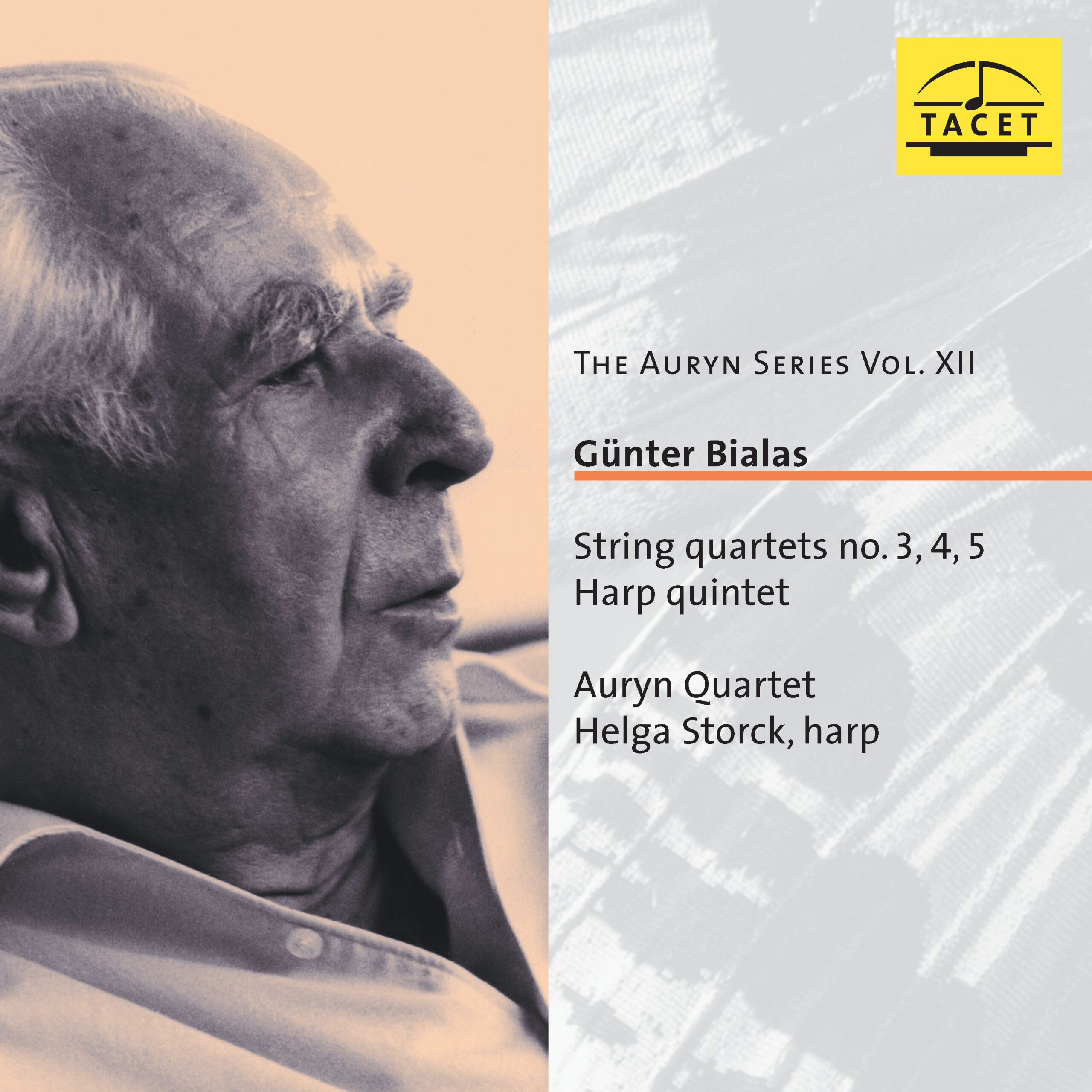
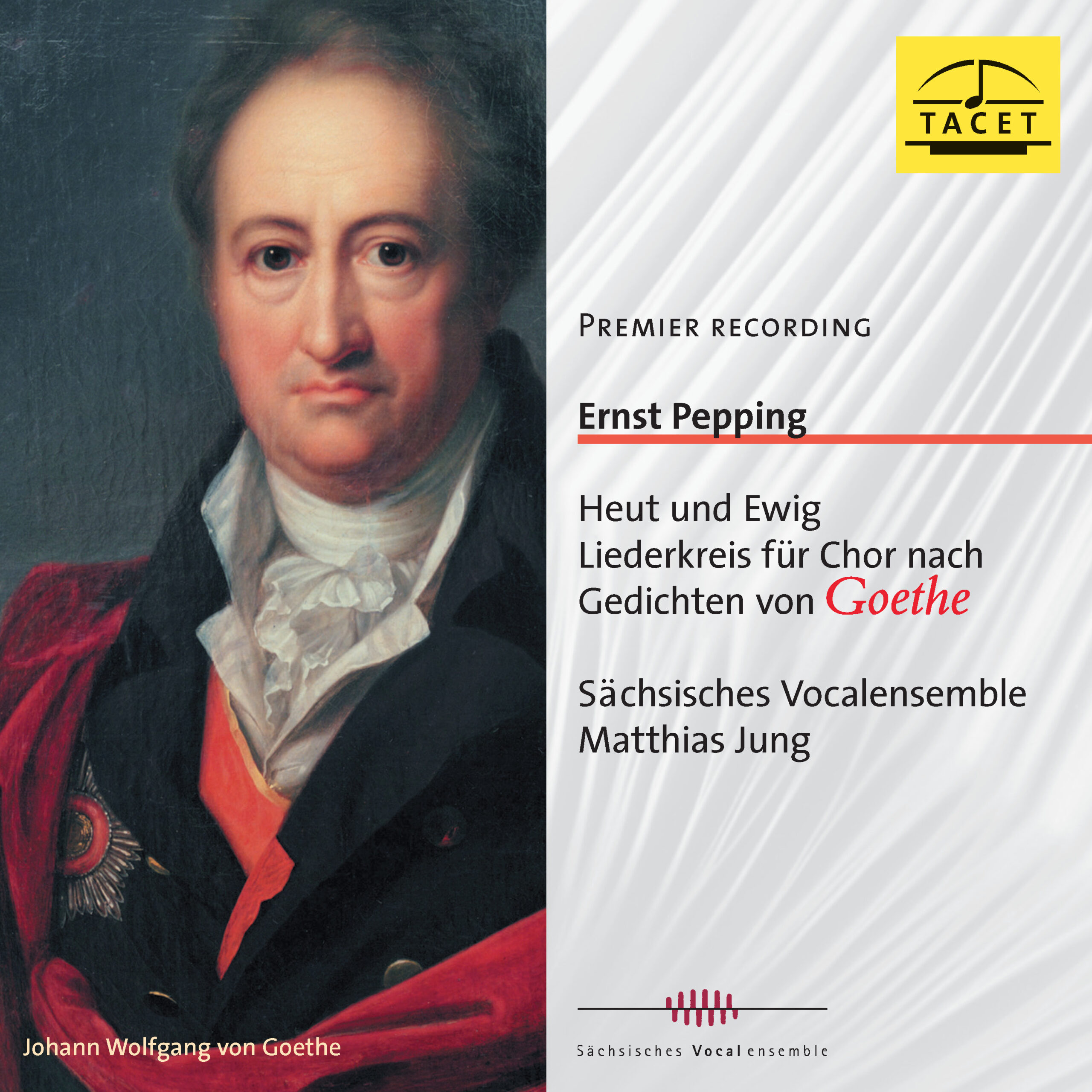
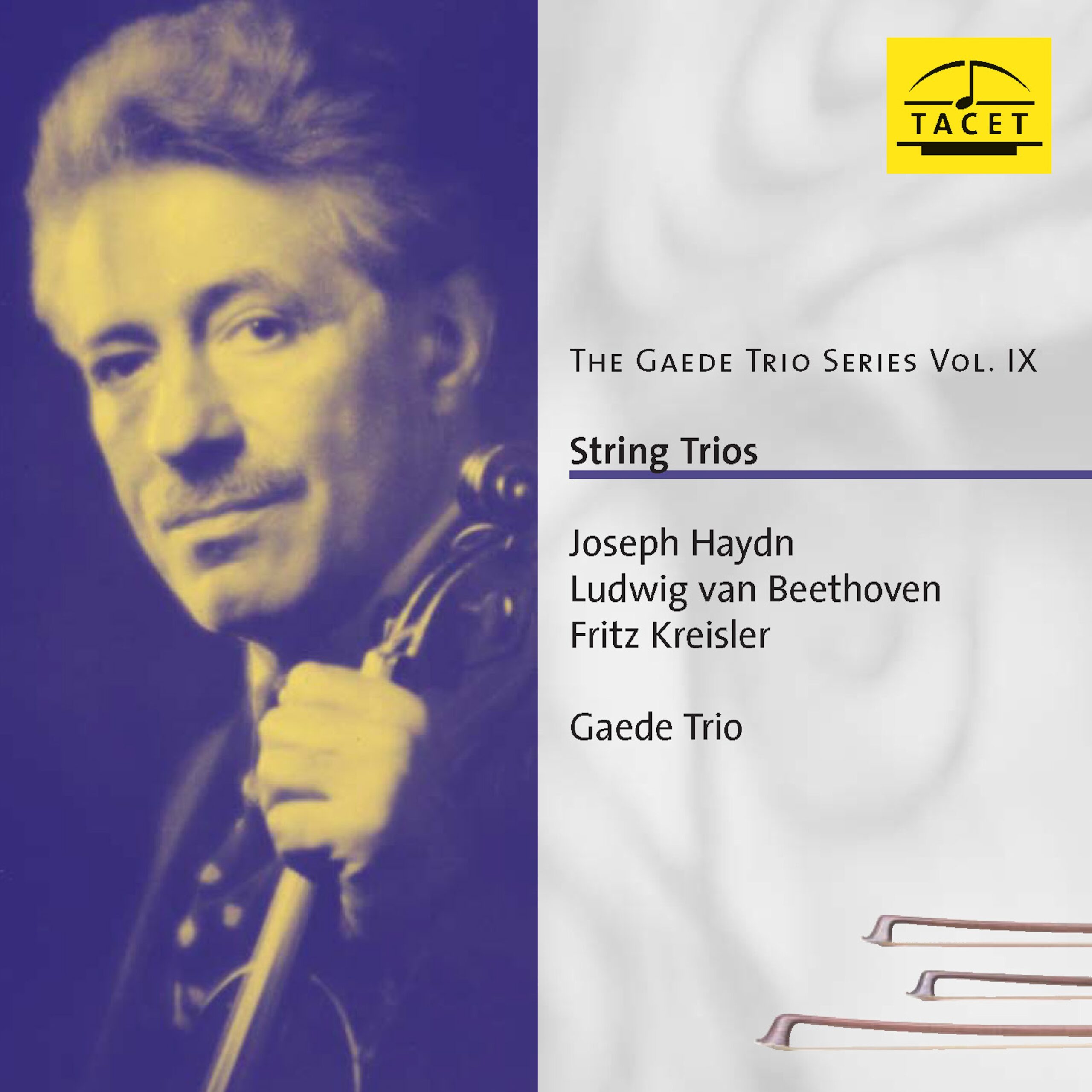
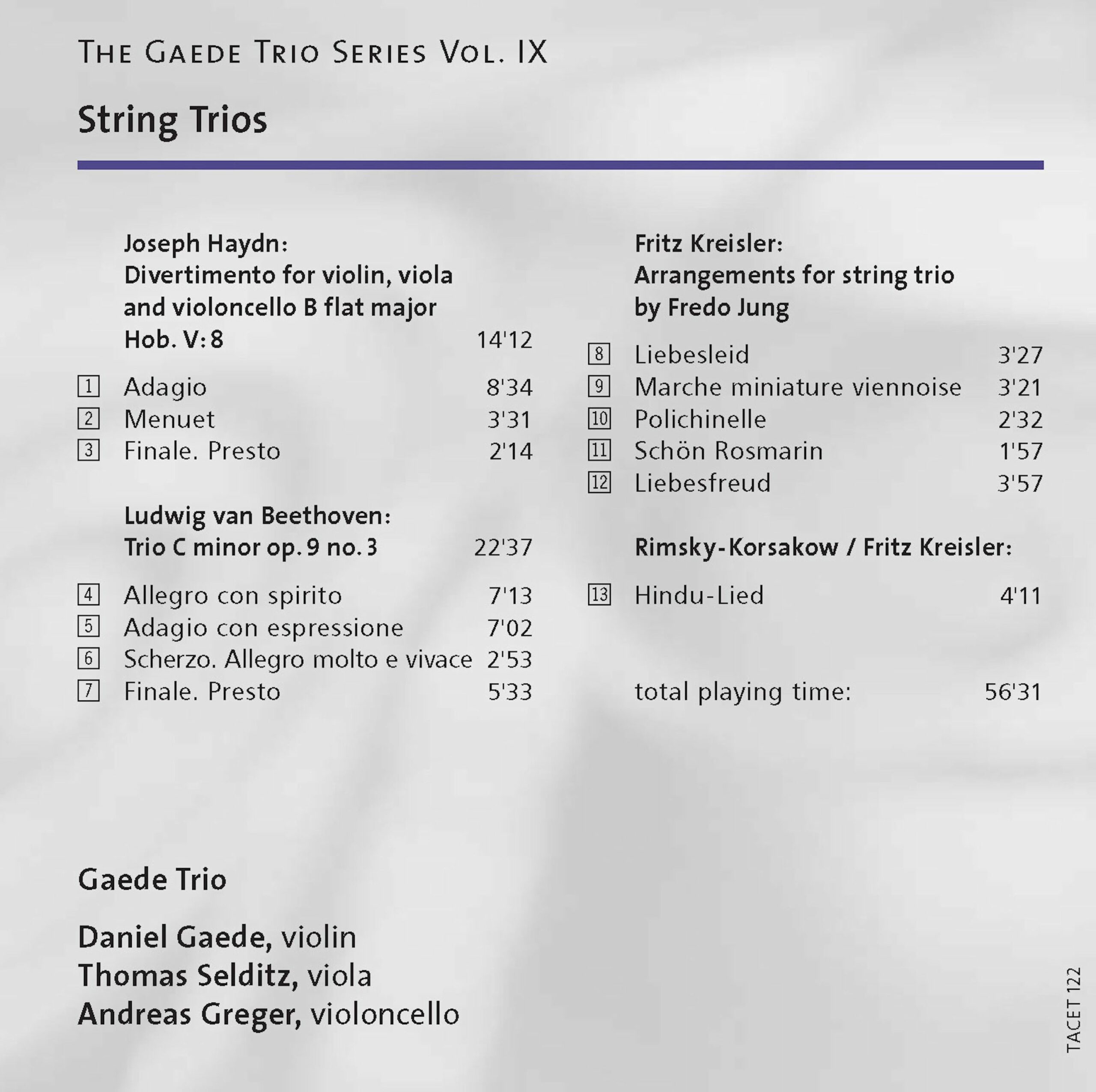
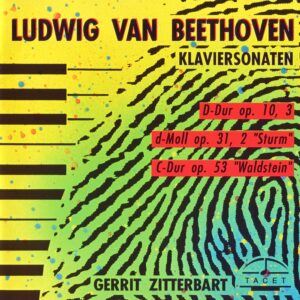
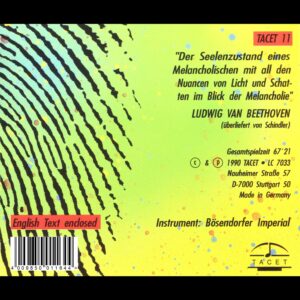
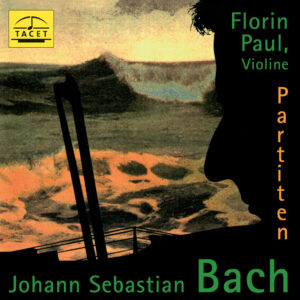

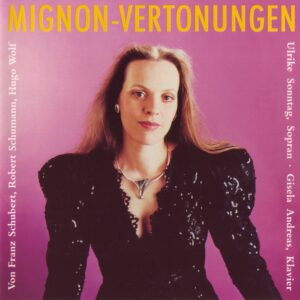
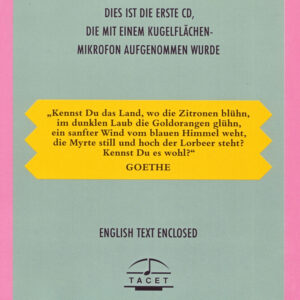
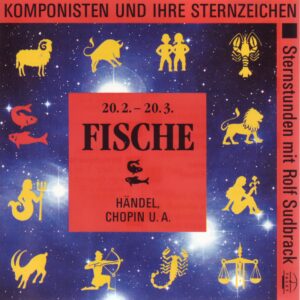



Crescendo –
According to the title page this is the ninth CD by the Gaede Trio. If the others are half as good as these ones then I’ve got some catching-up to do, I thought. Daniel Gaede, former leader of the Vienna Philharmonic Orchestra, and his colleagues from Berlin explore the whole bandwidth of interpretation, from a sparkling Haydn through Beethoven in his most dramatic C Minor mood to the café kitsch of Fritz Kreisler. The Kreisler arrangements by Fredo Jung do far more than simply convey the piano part: this is a fully thought-out composition for string trio, with a welcome fullness of sound and unexpected accompanying parts.
CMS
Ensemble –
Exquisite Craft – Witty Refinement
What is a divertimento in its original (that is, Italian) sense? An entertainment—and yes, also this: a delight. Combine the two nouns, and you are already in the act of listening to this very recording. Three gentlemen engage there in the most delightful of conversations, and it is Herr Joseph Haydn, by the grace of Esterházy, who has provided them with the material for their discourse. A charming piece, this String Trio in B-flat major, whose profound substance lies in the elaboration of its feinsinnig motivic work. The highest art of dialogue reigns here, and each of the three interlocutors contributes his modest share to ensure that this cultivated dispute—with all its playful teases and cross-references—enchants us. The same holds true for Beethoven, though as we know, this composer favors a somewhat more abrasive choice of words. The Gaede Trio takes him at his word in every instant, delivering an interpretation that reveals how close even the early Beethoven felt to the edges of the world—and how gladly (if not always!) he strolled along them with a corresponding furioso. Last but not least, there is the Schmankerl by Fritz Kreisler, arranged for string trio by Fredo Jung: miniatures brimming with esprit. And played as such. Dear Gaede Trio: we bow our heads in reverence.
Jürgen Otto
Die Tirolerin –
A Fresh Take on the Viennese Blend
Once again, the Gaede Trio has defied every convention, deconstructed masterful works, and woven them together into a true Wiener Melange*. At the heart of this unconventional approach lies Beethoven’s C-minor Trio, Op. 9 No. 3—which, framed by Haydn’s delicate divertimento and Fritz Kreisler’s café-house mischief, rises to its full grandeur.
Klassik heute –
With this recording, the Austrian-German Gaede Trio presents its ninth album for Tacet. The program is boldly eclectic, spanning Beethoven’s profound C-minor Trio alongside courtly and bourgeois entertainment music.
The CD opens as if the trio first needs to warm up: leisurely, with measured breath, in the variation movement of Haydn’s B-flat Divertimento. This inward calm, however, is deliberate—the music unfolds as a self-contained world, impervious to external influences like raw emotion. The sound avoids extremes, subtly but masterfully balancing dynamics and transparency of voicing. This almost objective stance creates a certain distance from the listener, yet it vividly traces the evolution of late 18th-century music. While Haydn’s trio centers on equilibrium between formal structure and expressive content, Beethoven’s C-minor Trio shifts decisively toward personal utterance.
Yet this historically pivotal work is framed not as a personal tragedy but as restless exploration. The trio’s swift, crystalline playing—blurring the line between primary and secondary voices—suggests less a private crisis than a fundamental musical upheaval at the century’s end. The instruments often shimmer rather than sing, their once-stable structures (as in Haydn) dissolving, held together only by Beethoven’s rigorous compositional logic. The Gaede Trio’s commitment to this rigor shines in the second and third movements. Though the violin’s Adagio con espressione unfolds with lyrical warmth, the true marvel lies in the ensemble’s economy—three voices united with the clarity of modernist architecture. The Scherzo merges turbulence and discipline, like a racehorse reined in with taut precision, the trio section a fleeting respite before the next surge. The finale’s aggressive drive echoes the opening movement’s intensity, yet also yields moments of lush, resonant calm.
That the Gaede Trio follows this towering Beethoven with arrangements of Fritz Kreisler’s music—whose portrait graces the cover—may nod to Haydn’s lighter side, but the juxtaposition isn’t entirely convincing. Yet the playing is irresistible. With Viennese charm, generous rubato, and a dash of melancholy, they evoke a vanished world that still lingers in café houses and ballrooms. One could almost sip a Kaisermelange to this music…
Above all, this recording showcases the Gaede Trio’s remarkable versatility and persuasiveness. Each work reveals distinct interpretive facets, woven into a cohesive whole. Their conviction makes even unlikely pairings—like Beethoven and Kreisler—compelling.
The engineering underscores the ensemble’s strengths: the three instruments emerge as a transparent yet richly blended sonic entity, naturally spaced and distinctly articulated.
Robert Spoula
Stuttgarter Zeitung –
Elegance from the Café
Having already proven their mastery of the formidable with a fabulous recording of Bach’s Goldberg Variations (TACET 70), the Gaede Trio now turns to (seemingly) lighter fare on their new CD. Fredo Jung has arranged six of Kreisler’s beloved pieces for string trio, and the Gaedes perform them with such precision and soul that they feel like great chamber music—without ever quite losing their café-house charm. It’s a refinement of the most tasteful kind, where a violinist’s playful flourish—like a unison portamento—creates an astonishing effect. Even Kreisler himself would have approved.
Frank Armbruster
Wiesbadener Anzeiger –
Beethoven at the Core
The Gaede Trio has earned widespread acclaim for its bold, unconventional connections—whether pairing Bach with Mozart, Mozart with Schubert and Roussel, or bringing Siegfried Matthus and Ernst von Dohnányi into dialogue with Schubert. Time and again, the ensemble deconstructs and recontextualizes musical works, as they now do in Tacet’s compact series, where Beethoven’s string trios serve as the intellectual fulcrum. Often dismissed as 'near-quartets,' these compositions become the foundation for unexpected relationships—like the Serenade Op. 8 in conversation with Ysaÿe and Eisler, or Krenek, Bach, and Francaix framing the D-major Trio Op. 9 No. 2. It sounds daring, but upon listening, the deeper logic emerges—and so it goes with their latest coupling, a quintessentially Viennese blend. At its heart lies the C-minor Trio Op. 9 No. 3, played with equal measures of mastery and spectral intensity, its spirit already hurtling toward early Romanticism. Flanking it are Haydn’s delicate Divertimento and a dash of Fritz Kreisler’s café-house mischief, his popular bonbons reimagined by Fredo Jung (b. 1949). Strangely, this idiosyncratic concept works—again and again.